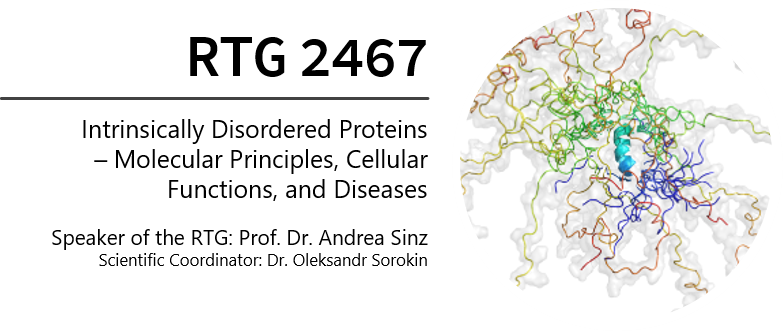Project within the RTG
Role of post-translational modifications at intrinsically disordered regions of key transcription factors in the control of plant immunity, cell death, and senescence
Plant-specific calcium-dependent protein kinases (CDPK) are key signaling components in the control of plant development and pathogen resistance in response to environmental stress cues (Erickson, Weckwerth, Romeis, & Lee, 2022). CDPKs phosphorylate substrate proteins at the plasma membrane as well as key transcription factors that are responsible for transcriptional reprogramming. Using in planta phospho-proteomics screens, we identified CPK1 phosphorylation sites at an IDR of Arabidopsis ORESARA1 (ORE1), a key transcription factor of senescence. Phosphorylation occurred at a hotspot within an IDR, and mutagenesis at this hotspot, as well as deletion of the entire gene, resulted in delayed plant senescence (Durian et al., 2021). These data link the CDPK-catalyzed phosphorylation in the IDR functionally to the control of plant senescence. Within the RTG2467, we will address how widespread calcium-regulated signaling mediated by CDPKs is in plants. Moreover, we will determine the role of CaM binding in how it regulates the functions of key transcription factors during the induction of long-term plant immunity and cell death.
Literature references
Jiang, X., Hoehenwarter, W., Scheel, D., & Lee, J. (2020). Phosphorylation of the CAMTA3 transcription factor triggers its destabilization and nuclear export. Plant Physiology, 184(2), 1056-1071.
Liu, N., Hake, K., Wang, W., Zhao, T., Romeis, T., & Tang, D. (2017). CALCIUM-DEPENDENT PROTEIN KINASE5 associates with the truncated NLR protein TIR-NBS2 to contribute to exo70B1-mediated immunity. The Plant Cell, 29(4), 746-759.
Website: https://www.ipb-halle.de/en/research/biochemistry-of-plant-interactions/
